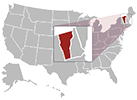
If you’re one of the many folks who want to work as a veterinary technician in Vermont, then this guide is for you!
You’ll learn how much time it will take you to become one a well as the salary you can expect once you get hired!
Page Navigation [show]
Veterinary Technician Job Description and Duties in Vermont
A vet technician’s day is rather full as they must complete many tasks received from the licensed veterinarian they assist.
Tasks are not the same across facilities or every day and they generally are:
- Administering medications
- Taking x-rays,
- Processing tissue samples,
- Assisting in surgery and emergency care
- Performing lab tests
- Teeth cleaning,
- Electrocardiography,
- Bandaging,
- Wound cleaning,
- Keeping accurate records
Vet techs cannot perform these tasks:
- Perform surgeries
- Prescribe medicine or treatments
Education and Training Required for Veterinary Technicians in Vermont
There are several states where these professionals are not required to hold a license before getting employed.
This is also the case with Vermont.
Despite this, many employers will prefer to hire someone with credentials.
For this purpose, an Associate’s Degree in Applied Science with Veterinary Technology specialization is needed before getting licensed.
This degree will be yours in about 2 years.
You can choose to obtain a Bachelor’s degree too, but this one takes about 4 years to complete.
Regardless of your choice, the program must be accredited by the American Veterinary Medical Association.
As you can see, Vermont has just one school you can enroll at.
Top 1 Schools in Vermont
| School Name | Address |
|---|---|
| Vermont Technical College | 124 Admin Dr, Randolph Center, VT 05061 |
Keep in mind that finding and enrolling in an appropriate program in a different state is allowed, regardless of how you attend your classes.
Pay attention to the spots as they’re generally limited, so you need to apply.
To apply you need:
- A high school diploma or GED
- An essay
- To pass an interview
- Health insurance
- A malpractice policy
- Antirabies vaccine
- To pass a TB test
- To have a clean criminal record
If you’re accepted, you’ll have to attend a number of preparatory classes before your first semester.
All future vet techs will study:
- Introduction to veterinary technology
- Anatomy and physiology
- Emergency care and first aid
- Pathology
- Anesthesiology
- Radiology
- Immunology
- Pharmacology
- Parasitology
- Toxicology
- Nutrition
All the vet tech programs have a practice component, regardless of how you attend your theory classes.
Distance or online programs will usually require you to find an approved site for these hands-on training classes, as well as the site for the exams.
Becoming a Licensed Veterinary Technician in Vermont
The license will be issued by the Vermont Veterinary Technician Association (VVTA) and only to those who attended an accredited training program.
To get licensed, you need:
- An application form
- Official transcripts from the school
- To pay some fees
- $300 for the exam
- $25 application fee
- $25 membership fee, for the first year
- To pass the Veterinary Technician National Examination (VTNE)
- To pass a criminal background check
- A letter of recommendation from a licensed and practicing veterinarian
For the exam, you have to correctly answer at least 70% of the 150 questions, and you have 3 hours for this.
The license must be kept up-to-date by completing some hours of continuing education and paying the renewal fee of $25.
Employment and Salaries for Veterinary Technicians in Vermont
It’s good to research your possible workplace in advance.
These are the main facilities where you can work:
- Private clinical practices
- Animal sanctuaries
- Veterinary teaching hospitals
- Rescue centers
- Wildlife or exotic animal rehabilitation centers
- Humane societies,
- Research facilities,
- Pharmaceutical companies
These are some of the employers in Vermont:
- Peak Veterinary Referral Center – Williston
- Vermont Companion Animal Neutering, Inc. – Middlesex
- Windsor Veterinary and Dental Services – Windsor
- VCA Brown Animal Hospital – South Burlington
- Vermont Veterinary Cardiology (Williston)
- Cats Vermont – Feline Veterinary Services (Burlington)
- Vermont Veterinary Surgical Center (Colchester)
- Heart of Vermont Veterinary House Calls (Central-Vermont)
- Arlington Equine Diagnostics (Arlington)
- Large Animal Medical Associates (Westford)
- Working Canine Services (Brattleboro)
- Bear Swamp Veterinary Service (Montpelier)
The table below shows how your location can affect how much you earn as a veterinary tech.
Annual Salary Range:Average Salary of Veterinary Technicians in Vermont
| City Name | Salary |
|---|---|
| Burlington | $36,494 |
| Essex | $36,494 |
| Rutland | $36,823 |
| Colchester | $36,494 |
| South Burlington | $36,494 |
| Bennington | $37,457 |
| Brattleboro | $37,570 |
| Hartford | $37,988 |
| Milton | $36,472 |
| Barre | $36,161 |
Additional Information for Veterinary Technicians in Vermont
This is a list of resources you can use to stay informed with changes related to this industry:
- NAVTA
- Veterinary Career Network
- Vet Tech Life
- Vetcetera,
- Where Techs Connect
- American Veterinary Medical Association
- Vermont Veterinary Technicians Association
- National Association of Veterinary Technicians in America
- Vermont Veterinary Medical Association
- Academy of Veterinary Technician Anesthetists
- Academy of Veterinary Emergency & Critical Care Technicians
- Academy of Internal Medicine for Veterinary Technicians
- American Association for Laboratory Animal Science




